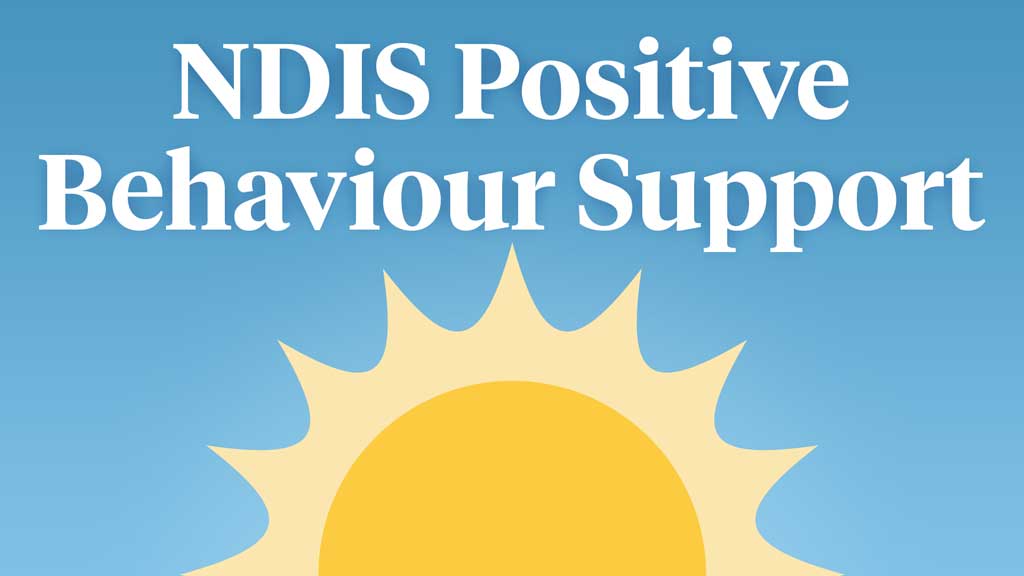Some National Disability Insurance Scheme (NDIS) participants require additional support to manage potentially harmful behaviours. In emergency situations, this might require the use of regulated restrictive practices in order to protect the participant, as well as those around them, from harm.
As these types of supports have been identified as high-risk (i.e. potentially causing harm to the participant and others around or supporting them), providers must follow specific requirements (NDIS 2020).
This article will look at the obligations of providers that are involved in developing or implementing behaviour support plans.
What are Behaviours of Concern?
Sometimes, NDIS participants display behaviours that indicate they require extra support. These are known as behaviours of concern. Often, these behaviours signal that the person is experiencing stress, wants to communicate something or has an unmet need (DSA 2021).
Behaviours of concern may pose a risk of harm to the NDIS participant themself, other people or objects (Scope 2009).
Examples of high-risk behaviours that could be potentially harmful to the person and those around them include:
- Self-harm (e.g. hurting, hitting or scratching themself)
- Hurting others (e.g. hitting, pinching, biting)
- Breaking objects
- Refusing to do something (e.g. eating, taking medicine)
- Screaming or swearing
- Disrobing
- Hiding from other people.
(Scope 2009)
Why do Behaviours of Concern Occur?
There are a variety of reasons why someone might display behaviours of concern. Often, there are multiple factors at play (Scope 2009).
These might include:
- Being in pain or feeling unwell
- Biological needs (e.g. being hungry or thirsty, needing to use the toilet)
- Wanting to communicate something, go to a certain place or do a particular activity
- Wanting a tangible object
- Feeling overstimulated (e.g. too many people around)
- Feeling uncomfortable in their environment (e.g. too hot or too cold, too noisy or too quiet, unpleasant smells)
- Feeling upset, lonely, bored etc.
- Seeking companionship, interaction or relationships
- Wanting to protest, escape, avoid, reduce or delay something.
(Scope 2009; Vic DHHS 2020)
Behaviour Support
The Positive Behaviour Support Capability Framework
The PBS Capability Framework outlines the expectations for best-practice behaviour support for NDIS participants (NDIS 2024a).
What is Positive Behaviour Support?
As part of their Zero Tolerance initiative, the NDS has released a series of five films on positive behaviour support. View them here.
The term positive behaviour support (PBS) is defined as ‘the integration of the contemporary ideology of disability service provision with the clinical framework of applied behaviour analysis’ (NDIS 2021).
PBS uses evidence-based strategies to improve the quality of life of those with disability and reduce behaviours of concern (NDIS 2024b).
PBS is underpinned by respect, dignity, empathy, choice, person-centredness and unconditional positive regard (NDS 2017).
The belief is that with appropriate support, and in the right environment, behaviours of concern can be reduced using positive strategies (Openminds 2019).
PBS can help to reduce behaviours of concern by:
- Helping the participant to be understood
- Adjusting the participant’s environment so that they feel more comfortable
- Improving the participant's lifestyle by providing them with opportunities to connect with the community and participate in activities they enjoy
- Helping the participant to foster meaningful relationships with others
- Ensuring the support environment is encouraging, fun and understanding.
(Openminds 2019)
Effective PBS strategies focus on:
- Changing environmental factors that lead to behaviours of concern
- Teaching the participant new skills to replace behaviours of concern
- Teaching the participant skills that increase their independence and quality of life
- Providing a framework to educate support workers and others on how to best respond to and modify the participant’s environment.
(Vic DHHS 2020)

Behaviour Support Plans
What is a Behaviour Support Plan?
PBS involves the development and implementation of behaviour support plans in order to support NDIS participants who display behaviours of concern.
A behaviour support plan is developed based on a behaviour support assessment that has been undertaken. It may include regulated restrictive practices if required (NDIS 2024c).
The behaviour support plan addresses a person’s needs and identifies complex behaviours of concern. It sets out individualised, evidence-based strategies that can be used to respond to these behaviours and improve the person’s quality of life (NDIS 2024c).
Research has shown that high-quality behaviour support plans not only improve the quality of supports being delivered but are associated with a decrease in the use of restrictive practices (Vic DHHS 2020).
A PBS plan that contains a restrictive practice should be reviewed at least every 12 months (NDIS 2024c).
What is an Interim Behaviour Support Plan?
An interim behaviour support plan is a brief, temporary plan that is developed when there is an immediate need for behaviour support. It is used until a behaviour support assessment has been undertaken and a comprehensive behaviour support plan has been developed (NDIS 2023).
What Does a Behaviour Support Plan Look Like?
Sample interim and comprehensive behaviour support plans can be found on the NDIS Quality and Safeguards Commission’s website.
What are the Requirements for Behaviour Support Plans?
In accordance with the NDIS (Restrictive Practices and Behaviour Support) Rules 2018, behaviour support plans must:
- Be developed by an NDIS behaviour support practitioner
- Clearly identify any restrictive practices and include:
- Plans for eliminating and reducing the use of the restrictive practice
- Plans for monitoring and reviewing
- Be developed within six months of the behaviour support practitioner being engaged (or within one month for an interim plan)
- Be developed in consultation with the NDIS participant and their family members, carers, implementing provider, guardians and/or any other relevant parties
- Be informed by a behaviour support assessment
- Contain evidence-based, person-centred, proactive strategies for addressing changed behaviours
- Be lodged with the NDIS Commission if regulated restrictive practices are included in the plan.
(NDIS 2020a)

Specialist Behaviour Support
Specialist behaviour support must be delivered by an NDIS behaviour support practitioner - a practitioner whom the NDIS Commission has assessed and deemed suitable to perform functional behaviour support assessments and develop behaviour support plans (NDIS 2020b).
Registered NDIS providers that engage behaviour support practitioners are known as specialist behaviour support providers (NDIS 2024b). These providers must be registered with the NDIS Commission (NDIS 2020b).
What is an Implementing Provider?
An implementing provider is any NDIS provider that uses restrictive practices in the delivery of supports (NDIS 2024b).
Conclusion
Behaviours of concern can be challenging to manage. However, it is important to consider why they may be occurring. By developing and implementing a behaviour support plan, these behaviours can hopefully be managed in a positive way that allows the participant’s needs to be addressed and improves their quality of life.
Note: Providers should be guided by their organisational policies. Always refer to your organisation’s policies and procedures.
Test Your Knowledge
Question 1 of 3
What is the primary goal of positive behaviour support?
Topics
Further your knowledge
References
- Dementia Support Australia 2021, Behaviour Support Plans – Your Essential Guide, DSA, viewed 17 September 2024, https://dementia.com.au/bsp/resources
- Disability Support Guide 2023, Restrictive Practice and the NDIS, Disability Support Guide, viewed 17 September 2024, https://www.disabilitysupportguide.com.au/information/article/restrictive-practice-and-the-ndis
- National Disability Services 2017, Considering Additional Risks, NDS, viewed 17 September 2024, https://www.nds.org.au/zero-tolerance-framework/considering-additional-risk
- NDIS Quality and Safety Commission 2020a, Behaviour Support and Restrictive Practices, Australian Government, viewed 17 September 2024, https://www.ndiscommission.gov.au/sites/default/files/2022-02/fact-sheet-behaviour-support-under-ndis-commission-july-2020-final.pdf
- NDIS Quality and Safety Commission 2020b, Your introduction to the Positive Behaviour Support Capability Framework, Australian Government, viewed 17 September 2024, https://www.ndiscommission.gov.au/sites/default/files/2022-05/provider-information-pack-intro-pbs-capability-framework.pdf
- NDIS Quality and Safety Commission 2021, Positive Behaviour Support Capability Framework: For NDIS Providers and Behaviour Support Practitioners, Australian Government, viewed 17 September 2024, https://www.ndiscommission.gov.au/sites/default/files/2022-02/ndis-commission-pbs-capability-framework-july2019-final-update-february2021_0.pdf
- NDIS Quality and Safety Commission 2023, Interim Behaviour Support Plan Checklist: Requirements for Specialist Behaviour Support Providers, Australian Government, viewed 17 September 2024, https://www.ndiscommission.gov.au/sites/default/files/2023-06/Interim%20BSP%20Checklist.PDF
- NDIS Quality and Safety Commission 2024a, The Positive Behaviour Support Capability Framework, Australian Government, viewed 17 September 2024, https://www.ndiscommission.gov.au/providers/understanding-behaviour-support-and-restrictive-practices-providers/positive-behaviour
- NDIS Quality and Safety Commission 2024b, Understanding Behaviour Support and Restrictive Practices - For Providers, Australian Government, viewed 17 September 2024, https://www.ndiscommission.gov.au/providers/understanding-behaviour-support-and-restrictive-practices-providers
- NDIS Quality and Safety Commission 2024c, Understanding Behaviour Support and Restrictive Practices - For Participants, Australian Government, viewed 17 September 2024, https://www.ndiscommission.gov.au/participants/incidents-and-behaviour-support/understanding-behaviour-support-and-restrictive-0
- Openminds 2019, ‘What is Positive Behaviour Support?’, Openminds News, 1 July, viewed 17 September 2024, https://openminds.org.au/news/what-positive-behaviour-support
- Scope 2009, Fact Sheet 5: Behaviours of Concern (Challenging Behaviour), Scope, viewed 17 September 2024, https://www.scopeaust.org.au/wp-content/uploads/2015/04/ChallengingBehavior-fact-sheet.pdf
- Victoria Department of Health and Human Services 2020, Behaviour Support Plan Toolkit, Victorian State Government, viewed 17 September 2024, https://www.dffh.vic.gov.au/sites/default/files/documents/202110/Behaviour%20Support%20Plan%20Toolkit%20-%20January%202021.pdf
 New
New 

